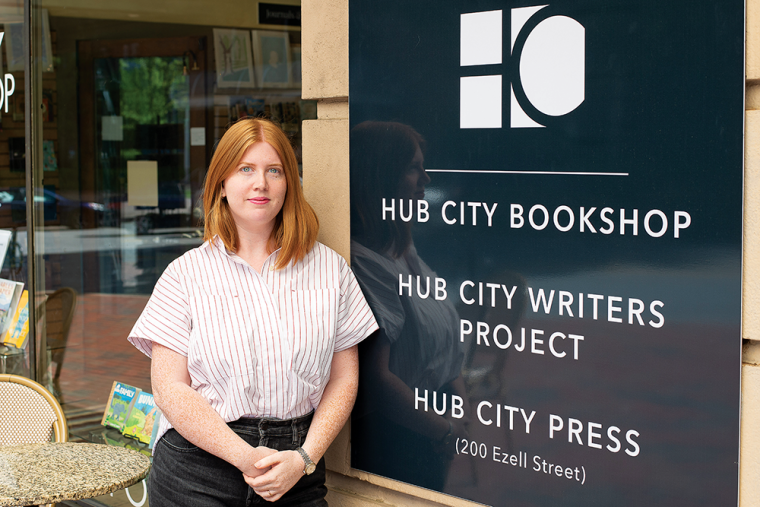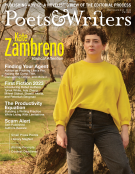In March, Hub City Writers Project (HCWP) of Spartanburg, South Carolina, one of the South’s leading literary nonprofits, named Meg Reid its new executive director and publisher, succeeding Anne Waters. Reid has spent the past ten years with HCWP and since 2017 has served as director of Hub City Press and programs. Under Reid’s leadership the famously “scrappy” press, founded nearly three decades ago, has garnered national accolades for publishing diverse voices in Southern poetry, fiction, and nonfiction. As executive director, Reid continues to oversee the press as well as the entire Hub City ecosystem, which includes fellowship and workshop programs, outreach to schools, and the Hub City Bookshop in Spartanburg. An innovative editor, designer, and fund-raiser, Reid spoke about her vision for HCWP.

Meg Reid stands outside the Hub City Bookshop in Spartanburg, South Carolina. (Credit: Joshua Gaffney)
Hub City has become the first place I look for new Southern writers, and a place that openly tries to “do it right” for its authors and its region. Can you give us a brief history of HCWP and where the organization is now?
We’ve been around since 1995, when a group of local writers started Hub City in the spirit of the Depression-era Federal Writers’ Project, which published place-based anthologies of local narratives. In 2010 we went national with our distribution and publicity and opened our bookstore. I came in shortly after that, when there was already a lot of goodwill for us in the state. My job initially was to boost the organization nationally, and say, “Hey, look at us!” We are much better known now—I don’t get as many blank stares when I go to AWP as I used to.
As a nonprofit, Hub City does more than just publish books. How do you see all the organization’s parts working together?
I want people to look to us the way they look at places like Tin House in the Northwest—for them to say, “Oh, they’re a publisher with conferences and workshops and other content.” There’s a real absence of that in the Southeast; we are the only literary publisher in South Carolina, the only organization offering these things on a large scale. It’s difficult because the arts infrastructure isn’t here the way it is in places like New York City, so I want us to become a full-service literary programmer for the region.
In addition to growing acclaim for HCWP, there are certain values I have made central to the press that I’m excited to expand on a larger, structural level. I am committed to transparency and decentralization in publishing systems. It’s my belief that a lot of publishers and larger arts organizations have kept these things opaque and centralized. As a smaller entity we have an ability to say, “Let me tell you how all this works.” From how we run our contests and outreach to how we approach our book marketing, I want HCWP to take on this ethos of being as transparent as possible. I want artists to be better advocates for themselves. And I want everybody to feel how integrated and aligned all our complex parts are, how they share the same values and vision.
Hub City consistently puts out a vibrant, inclusive list of titles and other community-facing content. How do you find writers? How do they find you?
The primary ways we find writers these days is through our open reading periods and through other authors and word-of-mouth. The bookshop, contests, and so forth build our network, so writers bring writers to our attention, and they trust us. The content we’re providing comes back to us tenfold. We love people bringing us content that maybe we haven’t seen yet. Also we have been very open about our goal to be intentionally corrective by representing the incredible diversity of the South, and we’re honored that so many writers from so many backgrounds find a home with us.
What are your favorite editorial projects, the ones you’ve felt most intimately connected to?
I feel very connected to all of my authors, but one person I think of is Ashley M. Jones. She is a great poet, and we didn’t know when we published her that she was going to become the first Black poet laureate of Alabama and the youngest. She came back to us for her book Reparations Now!, and that book was really important to me. Another one is Carter Sickels’s novel The Prettiest Star, which covers the rural AIDS crisis in the 1980s, won awards, and has been read by so many people. We changed things with those books and changed ourselves.
What do you think Hub City most needs as a nonprofit?
The next step is to continue our growth in a sensible way that keeps our core values. We speak to the importance of small and community publishers, and how they reflect a more true and diverse experience of their regions. If that can be done in Spartanburg, South Carolina, it can be done anywhere! The main thing is to increase our national visibility. Our strong community backing helps, but I would love for our donor base to be younger and broader. National and federal funding is great—we are one of only three publishers in the South funded by the NEA—but hard to find, so if people love what we’re doing, we’d love their support.
What is Southern literature in the twenty-first century?
I really bristle against this idea of “Southern literature.” We have always focused on the people who are here, but the South is not a monolith. It’s one of the most diverse and queerest regions in the country, with so many rich communities. I get in trouble when people talk about “traditional” Southern writing because that iconic, sweet-tea-magnolia stuff? I’m not drawn to that. We often reject those books. We want people to expand their notions of the South, and a book like Anjali Enjeti’s The Parted Earth, about the immigrant experience in Atlanta, is a great example. We are very interested in books that upend traditional Southern stories.
Do you think the moniker “regional literature” helps or hinders books or writers in the wider national conversation?
I love this question; it’s like a porterhouse steak for me! When I first got here, I hated the word regional, because I thought it was derogatory and a terrible word in publishing. In the last few years, with the help of small publishers, I think there’s a real reclamation of the word regional. Regional is the opposite of centralized; it is the opposite of conglomerate. It’s specific. It’s authentic. And the authors who have made the most impact in the past century deal in specificity of place and people. I have completely changed my mind on this word. Hub City is proudly regional, and because we’re a nonprofit, it makes us more tightly aligned to our mission. There is a real benefit to being regional, to saying we’re not worried about everybody else out there. That allows us to have independence.
What are you seeing from other presses that you want to emulate or be part of?
We feel in community with a great cohort—Belt Publishing, West Virginia University Press, others in our region—who are trying to do publishing the right way. I also love Two Dollar Radio and how they’ve put Columbus, Ohio, on the literary map. Aspirationally we look to Minneapolis, to Coffee House Press, Graywolf Press, and Milkweed Editions, which are so remarkable. I am always learning about more regional presses, like Heyday in California or the University of Texas Press, which is just killing it. I think we’re in a really nice era of independent and university presses operating at a high level. In some ways the pandemic really opened things up for us, and we’ve seen more indie books getting attention. We’re able to show writers there’s more than one path to success, so it’s a really positive environment right now.
What excites you professionally? How do you hope to manage such a vital part of the region’s culture and keep the joy for what you do?
Everybody who works at Hub City is an amazing person who loves this place. It’s a big job, and it’s daunting, but I’m excited to hear what the people around me want to do next. It’s an honor to be driving the organization forward into its next chapter. It makes me sad that the front table of many bookstores have a very small number of publishers, so I hope readers will look at the spines when they shop for books and be a little bit more curious about publishing systems. We would all have richer reading lives if we expanded where we get our literature from. Books are made by people, and the only way to make publishing more equitable is to remember that, and to bring place and people back into their production. That’s where I get my joy from.
What’s not in your official bio that might interest book watchers?
I grew up in Canada and Maine, and when I started out at Hub City, I knew I wanted to stay in publishing and not live in New York or anywhere there is snow. So obviously that was really limiting, because there aren’t many publishers in the South. I came to Hub City as an assistant director of the press, and everything was very hands on, author centered, and boutique, so I felt immediately at home. I have been here since 2013, and Hub City feels like a giant part of me.
Leah Hampton is the author of F*ckface: and Other Stories (Henry Holt, 2020). She teaches creative writing at the University of Idaho and divides her time between Appalachia and the Pacific Northwest.








